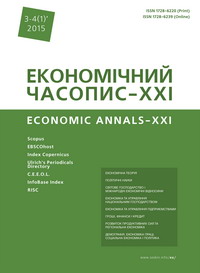Бюджетная политика как инструмент макроэкономической стабильности
Fiscal policy as an instrument of macroeconomic stability
Author(s): Tetyana BogolibSubject(s): Economy
Published by: Institute of Society Transformation
Keywords: Budgetary Policy; Macroeconomic Stability; Budgetary Rules; Income; Expenses; State Debt; Currency Rate
Summary/Abstract: Introduction. Budget policy in Ukraine has not yet become the main instrument for reaching the parameters of macroeconomic stability, structural reforms completing and economic development achieving. Efficiency of expenses is low, GDP falls, and currency rate and state debt grow without a reasonable basis. Under such circumstances, selection of the new model of budgetary policy which would lead to macroeconomic stability, stimulate growth of economy and increase life standards of the population is among the top-priority tasks. Purpose is to develop counter-cyclic stabilizing mechanisms of budgetary policy accountable for the macroeconomic stability and economic growth. Methods. A complex of general and special methods has been applied, in particular: systemic method, method of generalization, as well as analysis and synthesis. Results. Corresponding analysis permits to draw the conclusion that the economy of Ukraine is definitely in the crisis condition. Budgetary policy does not represent the stabilizing instrument of economic development. For the time being we need a new model of budgetary policy which would provide economic growth and macroeconomic stability. The new model of budgetary policy should be based on the budgetary rules regulating the order of budget income usage, limiting the growth of expenses and state debt, regulating the actions of the Cabinet of Ministers of Ukraine in case of currency exchange rate decline and prices for the energy resources growth in comparison with basic prices. Introduction of budgetary rules will permit efficiency of budgetary policy improvement; provide financing for the Ukrainian economy, complete structural reforms and new industrialization, and increase investments in the human capital without any threats to the macroeconomic stability. Conclusion. Within the context of crisis challenges and lessons, key tasks in the sphere of budget policy cover transformation of the budget mechanism to the effective instrument of macroeconomic stabilization and simultaneous maximal usage of all the reserves of accumulated budget expenditures for further financing of top-priority expenses for the development of economy and human capital. The following actions should be undertaken for efficient performance of the above mentioned tasks: provision of conservative approach to the budgetary planning; long-term stabilization of prices for energy resources and currency rate; adoption of the framework rules limiting the budgetary expenses growth; implementation of economically feasible debt policy; minimization of currency risks for economics, i.e. introduction of budgetary rules.
Journal: Економічний часопис - ХХІ
- Issue Year: 2015
- Issue No: 3-4(1)
- Page Range: 84-87
- Page Count: 4

